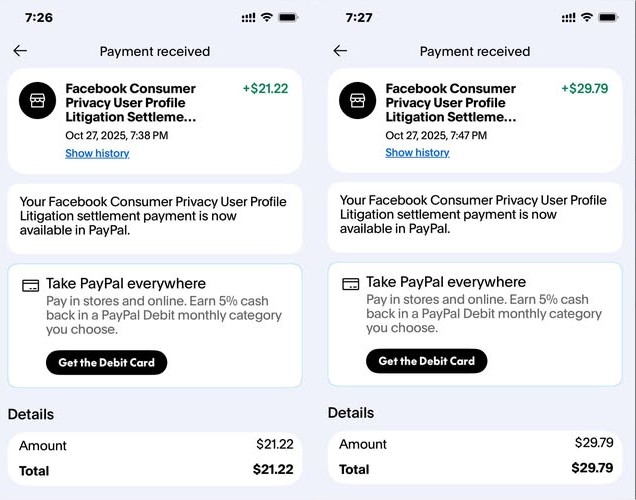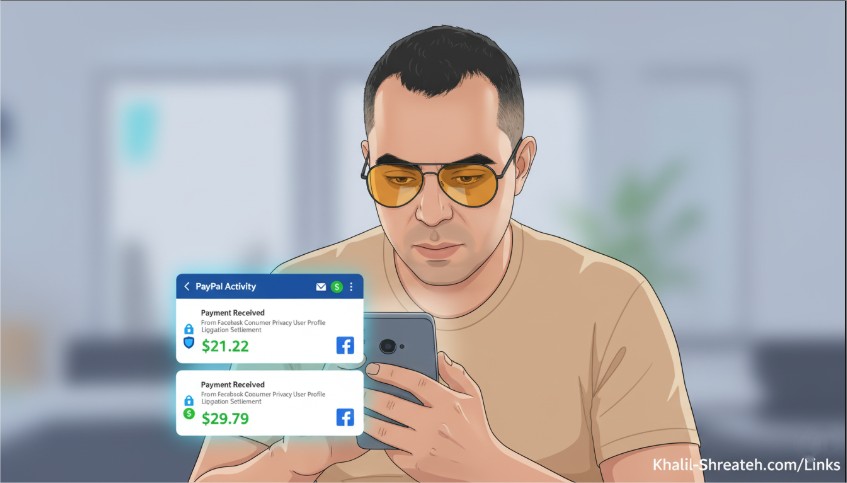In this article, I will share my personal experience receiving $51 from a legal settlement between facebook and its users. This payout was part of a consumer privacy settlement that addressed concerns over the handling of users’ personal information. The settlement was processed through PayPal, and it provided an opportunity for users affected by privacy issues to receive compensation. The topic of privacy and data protection has become increasingly important in today’s digital age. Facebook, as one of the largest social networks in the world, has faced multiple lawsuits related to user privacy, and this settlement represents one of those corrective measures.
What is the Facebook Privacy User Profile Settlement?
The Facebook Consumer Privacy User Profile settlement is a legal agreement between Facebook and users who believed their personal data had been misused or exposed without consent. The settlement compensates affected users for potential damages caused by breaches in privacy.
Essentially, this settlement is Facebook’s acknowledgment of privacy issues and their responsibility to remedy situations where users’ data was improperly handled.
Why Did Facebook Offer This Settlement?
The settlement arose due to multiple reports that Facebook collected or shared user data without proper authorization. Privacy advocates and legal authorities highlighted the need for accountability.
Users who felt their private information had been compromised were eligible to file claims. Facebook’s settlement was designed to provide financial redress and improve overall transparency in data handling practices.
How I Found Out About the Settlement
I first learned about the settlement through official emails from Facebook and public announcements. Social media users began sharing their experiences with the claims process, which made it easier for others to understand how to participate.
The email provided clear instructions for filing a claim and explained how the settlement would be processed via PayPal. This gave users a convenient method to receive their compensation without additional administrative hassle.
The Claims Process
Submitting a claim was straightforward. Users had to provide their basic information, such as name, email, and PayPal account. The process was online, and Facebook verified eligibility automatically.
I submitted my claim through the official portal. Within a few weeks, I received confirmation that my claim was approved, and the payout would be sent via PayPal.
Receiving the PayPal Payment
Once my claim was approved, the payment appeared in my PayPal account. The total amount was $51, which, while not substantial, symbolized the importance of user privacy and accountability.
PayPal notifications ensured I was aware of the transfer, and the funds were available immediately for use. This ease of access was one of the most convenient aspects of the settlement.
My Personal Experience
I received the amount on the same PayPal account from two Facebook accounts, because the settlement was credited to both Facebook accounts, as shown in the picture:
- First payment: $21.22
- Second payment: $29.79

Why $51? Understanding Settlement Calculations
The settlement amount varied for users depending on eligibility, participation rates, and the total settlement fund allocated. $51 represents a proportional share of the fund distributed among thousands of claimants.
While the amount might seem modest, it serves as a tangible acknowledgment of the privacy concerns raised by users. The larger goal is accountability and policy change.
Lessons Learned About Digital Privacy
This experience reinforced the importance of understanding digital privacy. Users must be aware of how their data is collected, shared, and stored by social networks.
Even seemingly minor actions online, such as likes, shares, and profile updates, contribute to a digital footprint that companies can analyze. Awareness and caution are key to protecting personal information
Facebook’s Commitment to Privacy
Following the settlement, Facebook announced changes to privacy policies and user data handling procedures. The company introduced new privacy controls, improved transparency about data usage, and simplified consent forms.
These measures aim to restore user trust and prevent future legal disputes. It demonstrates that settlements like this can drive meaningful changes in corporate practices.
The Role of Legal Oversight
Legal oversight played a critical role in this settlement. Privacy laws and regulations compelled Facebook to address the issue seriously and offer compensation.
Government agencies, advocacy groups, and consumer protection organizations monitor companies to ensure compliance with data privacy standards. This case highlights how law can protect users’ rights in the digital age.
User Feedback and Community Impact
Many users shared their experiences online, creating awareness about privacy settlements. Social media discussions encouraged others to file claims and highlighted the importance of user advocacy.
Community feedback also pressures companies like Facebook to maintain ethical practices, improving the digital environment for everyone.
The Emotional Impact of the Settlement
Receiving the settlement brought a sense of satisfaction, knowing that user voices were heard and validated. Even though $51 might not compensate for all privacy concerns, it represents recognition and accountability.
Such settlements can empower users to be more vigilant about digital privacy and demand better data protection measures from tech companies.
How to File a Claim
For those eligible, filing a claim is usually done through an official online portal. Users must provide accurate personal details, including payment information.
The process is designed to be transparent and user-friendly, ensuring that claimants can receive their settlement without undue complications.
Common Questions About the Settlement
- Who is eligible? Users whose personal data was affected by Facebook’s handling practices.
- How is the payment distributed? Through approved channels like PayPal.
- What is the average payout? Varies depending on fund allocation and number of claimants.
These FAQs help users navigate the settlement process efficiently.
Tips for Protecting Digital Privacy
- Regularly review privacy settings on social media.
- Limit sharing of sensitive personal information online.
- Monitor accounts for suspicious activity.
- Stay informed about company policies and legal actions.
By following these steps, users can minimize risks and protect their digital identities.
Broader Implications for Social Media Users
The settlement underscores the importance of corporate accountability in the digital space. Users are increasingly aware of their rights and the legal mechanisms available to protect them.
It also highlights the power of community and advocacy, showing that collective action can influence corporate behavior.
The Future of Online Privacy
The Facebook settlement is part of a growing trend of privacy-focused legal actions. Social networks are being held accountable for the management of personal data.
Future legal developments will likely strengthen protections, requiring companies to implement more transparent and ethical data handling practices.

